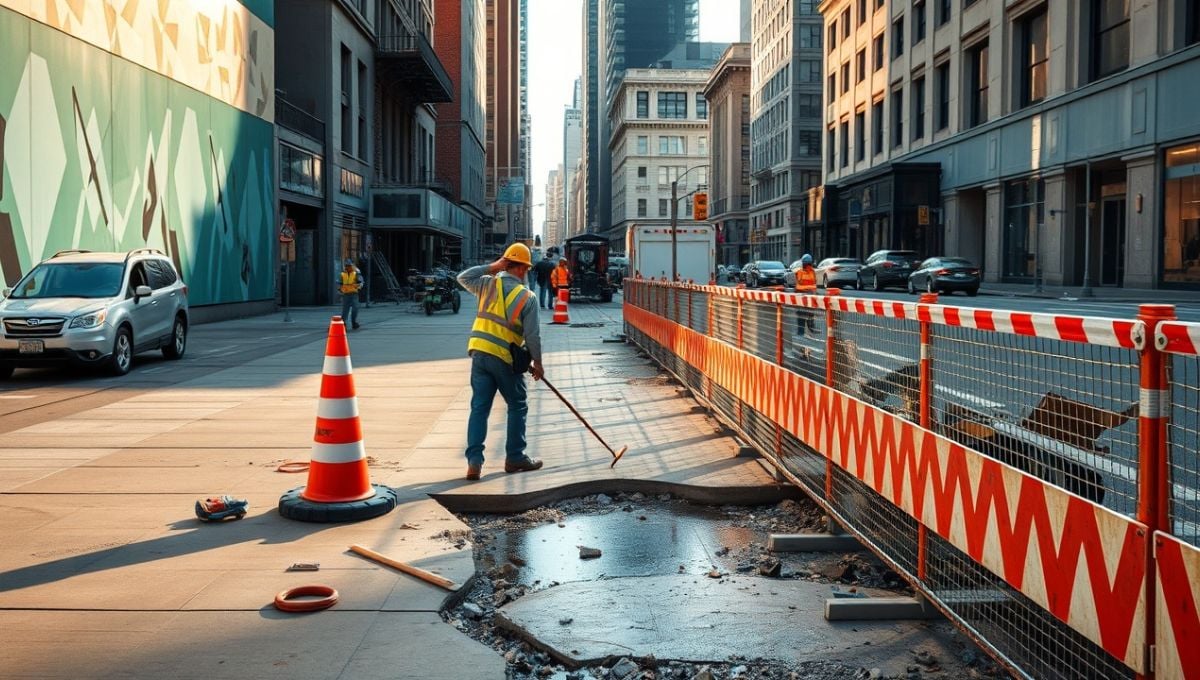Sidewalk maintenance is a crucial part of keeping New York City safe and walkable for everyone. Whether you’re a property owner, tenant, or someone simply trying to understand the ins and outs of legal sidewalk responsibilities, knowing where you stand and what’s required can save you from costly fines and potential legal issues. This guide dives into everything you need to know about the legal aspects of sidewalk repairs in NYC, the roles of property owners, and the rules you must follow to stay compliant.

Who Is Responsible? Property Owners vs. City
New York City law makes property owners primarily responsible for sidewalk maintenance and repair. This means if the sidewalk in front of your property has cracks, potholes, or uneven pavement, it’s your duty to repair it. The only exceptions are sidewalks directly adjacent to city-owned properties, in which case, the City of New York handles repairs.
The city’s policy aims to ensure sidewalks are safe for pedestrians while holding property owners accountable for their property’s access ways. If neglected, damaged sidewalks can lead to significant liabilities, especially if someone is injured due to a fall caused by the disrepair.
NYC DOT Sidewalk Inspection Program
The NYC Department of Transportation (DOT) regularly inspects sidewalks citywide to identify hazards such as cracks, missing slabs, or trip hazards caused by displacement of over 0.5 inches. If an inspector identifies violations, they issue a formal notice to the property owner, giving them about 45 days to fix the issue.
Failure to remedy the problem could result in the city hiring its contractors to perform the work and billing you through a “DOF Sidewalk Assessment” directly added to your property taxes. Keeping an eye on official notifications and emails related to sidewalk inspections can help you avoid unexpected repairs and fines.
Common Sidewalk Violations and How to Avoid Them
To be proactive, here are some of the most common sidewalk violations cited by the NYC DOT, and tips to address them efficiently:
- Cracked Sidewalk Panels: Over time, wear and tear can lead to cracked or uneven slabs of concrete. Consider adding weather-resistant coatings to mitigate cracking.
- Tree Roots Uplifting Pavement: Contact the NYC Parks Department for guidance on resolving issues caused by tree roots. They may offer solutions before removing trees or interfering with root systems.
- Improper Repairs: When repairing sidewalks, ensure regulations for sidewalk concrete repair are followed precisely, including using approved materials.
- Obstructions: Removing unnecessary debris or obstructions from your sidewalk is vital since you may be fined for these hazards, even if unrelated to concrete integrity.
To better understand full compliance or to access forums discussing guidelines, consider visiting reputable sources like the National Association of Concrete Contractors. Their guidelines help ensure repairs are legal and durable.
Hiring a Contractor: Permits and Insurance
Hiring a contractor to handle sidewalk repairs is a smart choice, but only if you follow the necessary legal steps:
- Select a Licensed Sidewalk Repair Contractor
Ensure your contractor is licensed by the NYC Department of Consumer Affairs for sidewalk repair work.
- Obtain the Necessary Permits
A Sidewalk Construction Permit is required when performing work. Contractors typically handle this, but it’s your responsibility to ensure they follow through.
- Check for Liability Insurance
Confirm the contractor has adequate insurance coverage to prevent financial liability for accidents that may occur during construction.
For property owners unfamiliar with permit logistics, various organizations provide resources detailing permit laws and processes.
Navigating Sidewalk Repair Costs and Financing
Repairing sidewalks is no small expense, with typical costs ranging from $1,000 to $5,000, depending on the repair’s scope and specifications. The city may offer financial assistance programs or resources to alleviate the financial burden, including:
- City Loans or Grants
NYC occasionally provides grant programs to assist low-income property owners with mandatory sidewalk repairs. Keep an eye on city announcements regarding these funds.
- Splitting Costs With Neighbors
Properties sharing extensive sidewalks, such as connected duplexes or front courtyards, may share repair costs under formal agreements.
By taking preventive steps like consulting professional sidewalk inspection services early, you’ll save money in the long term.
What to Do After Repairs: Final Inspection and Sign-Off
Once sidewalk repairs are complete, schedule a final inspection. The NYC DOT will revisit your property to ensure all violations have been addressed according to the code. Only after passing an inspection can the repair process be classified as legally compliant.
Here’s what to keep in mind:
- Keep all permits, invoices, and correspondence as proof of compliance.
- If additional corrections are needed, act promptly to avoid reopening violation cases.
- Subscribe to newsletters from organizations like the American Concrete Institute to stay updated on compliance standards.

Ensuring Safe Sidewalks for All New Yorkers
Sidewalks are a critical part of NYC’s infrastructure. By taking responsibility for your property’s section and staying compliant with local laws, you contribute to keeping all New Yorkers safe.
For professional assistance, rely on trusted companies like NYC Sidewalk Repair to handle every aspect of your sidewalk needs. Whether it’s sidewalk concrete repair, sidewalk replacement, or even navigating complicated city permits, our team is ready to help. Contact us today for a free consultation and ensure your sidewalks meet every legal requirement.
